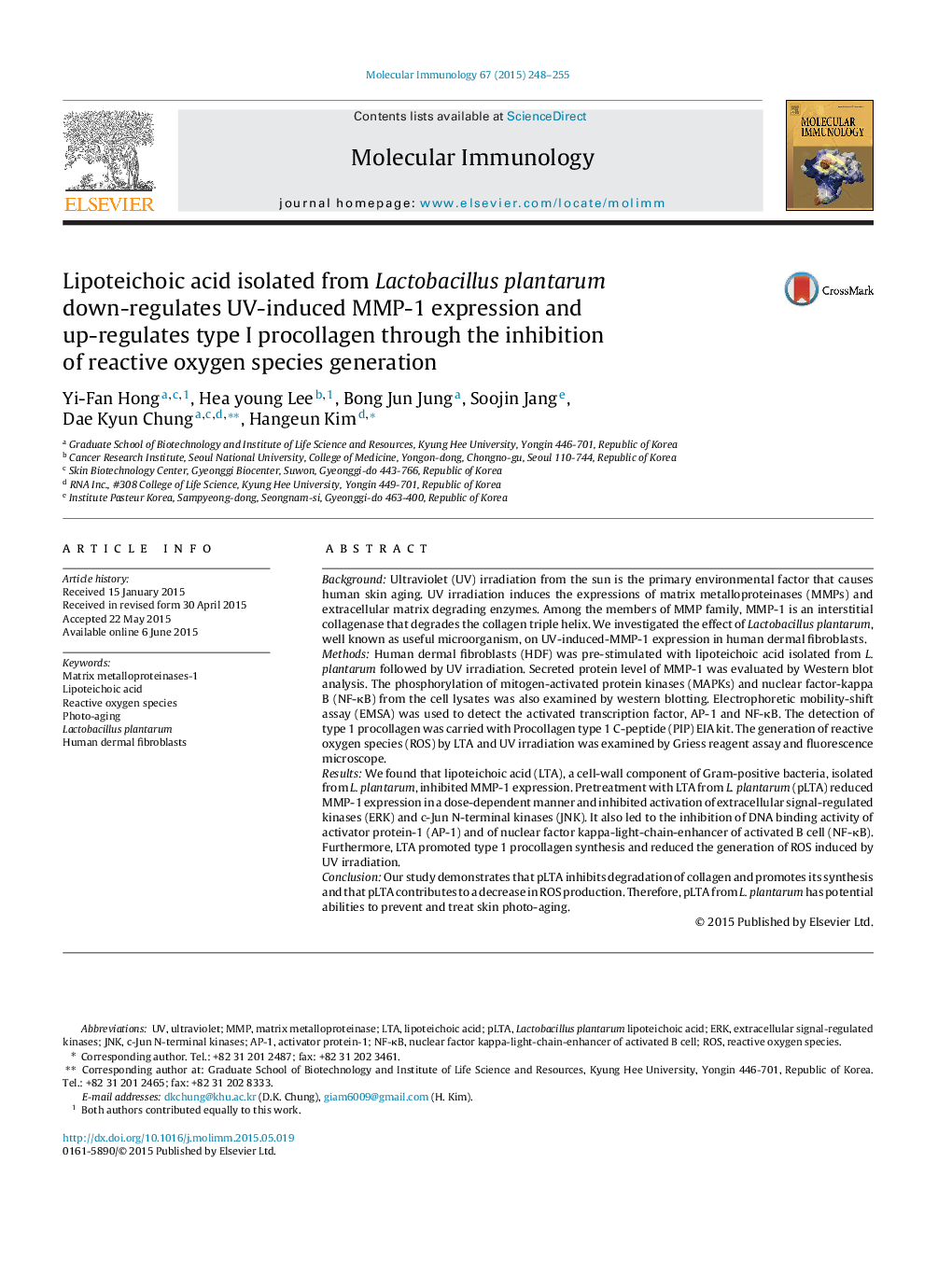| کد مقاله | کد نشریه | سال انتشار | مقاله انگلیسی | نسخه تمام متن |
|---|---|---|---|---|
| 5916629 | 1163753 | 2015 | 8 صفحه PDF | دانلود رایگان |

- We found that lipoteichoic acid (LTA), a cell-wall component of Gram-positive bacteria, isolated from Lactobacillus plantarum, inhibited matrix metalloproteinases-1 (MMP-1) expression.
- MMP-1 inhibition in LTA-stimulated cells was mediated by the inactivation of extracellular signal-regulated kinases (ERK) and c-Jun N-terminal kinases (JNK).
- DNA binding activity of activator protein-1 (AP-1) and of nuclear factor kappa-light-chain-enhancer of activated B cell (NF-κB) was reduced by LTA treatment.
- LTA promoted type 1 procollagen synthesis and reduced the generation of ROS induced by UV irradiation.
- Therefore, LTA from L. plantarum has potential abilities to prevent and treat skin photo-aging.
BackgroundUltraviolet (UV) irradiation from the sun is the primary environmental factor that causes human skin aging. UV irradiation induces the expressions of matrix metalloproteinases (MMPs) and extracellular matrix degrading enzymes. Among the members of MMP family, MMP-1 is an interstitial collagenase that degrades the collagen triple helix. We investigated the effect of Lactobacillus plantarum, well known as useful microorganism, on UV-induced-MMP-1 expression in human dermal fibroblasts.MethodsHuman dermal fibroblasts (HDF) was pre-stimulated with lipoteichoic acid isolated from L. plantarum followed by UV irradiation. Secreted protein level of MMP-1 was evaluated by Western blot analysis. The phosphorylation of mitogen-activated protein kinases (MAPKs) and nuclear factor-kappa B (NF-κB) from the cell lysates was also examined by western blotting. Electrophoretic mobility-shift assay (EMSA) was used to detect the activated transcription factor, AP-1 and NF-κB. The detection of type 1 procollagen was carried with Procollagen type 1 C-peptide (PIP) EIA kit. The generation of reactive oxygen species (ROS) by LTA and UV irradiation was examined by Griess reagent assay and fluorescence microscope.ResultsWe found that lipoteichoic acid (LTA), a cell-wall component of Gram-positive bacteria, isolated from L. plantarum, inhibited MMP-1 expression. Pretreatment with LTA from L. plantarum (pLTA) reduced MMP-1 expression in a dose-dependent manner and inhibited activation of extracellular signal-regulated kinases (ERK) and c-Jun N-terminal kinases (JNK). It also led to the inhibition of DNA binding activity of activator protein-1 (AP-1) and of nuclear factor kappa-light-chain-enhancer of activated B cell (NF-κB). Furthermore, LTA promoted type 1 procollagen synthesis and reduced the generation of ROS induced by UV irradiation.ConclusionOur study demonstrates that pLTA inhibits degradation of collagen and promotes its synthesis and that pLTA contributes to a decrease in ROS production. Therefore, pLTA from L. plantarum has potential abilities to prevent and treat skin photo-aging.
Journal: Molecular Immunology - Volume 67, Issue 2, Part B, October 2015, Pages 248-255